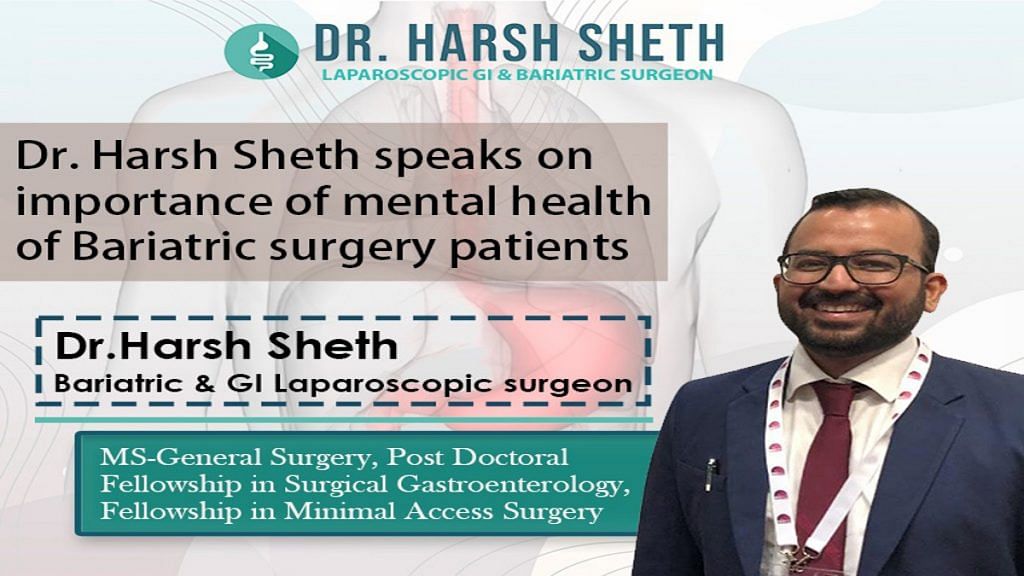Bariatric surgery has emerged as one of the most reliable solutions to combat obesity. However, the patient’s mental health is a crucial aspect that needs consideration, along with the physical and medical aspects of bariatric surgery.
Most bariatric surgeons seek to evaluate the patient’s mental health before going ahead with the surgery. The patient is also likely to need counselling after the procedure.
Dr. Harsh Sheth, one of Mumbai’s leading bariatric surgeons, says, “We need to understand the patient with regards to their weight issue — the challenges faced, the available family support, the patient’s mindset and many other factors. But at the same time, they need to have a strong support system after the surgery.”
“We do an in-depth evaluation of the patient and analyse their triggers, challenges, reasons for weight gain, binge eating disorders, and so on. On similar lines, we need to foresee the innate capability of the patient to face psychological, behavioural, and relationship changes post-surgery. We try to understand the mood swings, especially depression, anxiety, and emotional strength of the patient. We agree with the proposed bariatric surgery only if we feel confident that the patient can face these challenges positively through psychological support,” he adds.
At this juncture, the treating surgeon briefs the patient about the procedure and the changes in lifestyle and eating habits while ensuring that the patient stays healthy by consuming vitamins and other essential supplements. There will be long-term changes in the patient’s body, both physically and mentally.
Dr. Harsh also speaks of the need for counselling and support after bariatric surgery. He has dealt with cases in which the patient is unable to cope with the post-surgical changes as expected.
Take for example Mrs. X, a 35-year-old female with a history of binge eating disorder, who underwent bariatric surgery without counselling at another centre. She came to Dr. Harsh’s clinic six years later with a 30 per cent weight gain. All she needed was counselling and psychotherapy to treat the binge eating disorder, following which she continued with her weight loss journey in a healthier manner.
Dietary restrictions: Patients with a history of binge eating or overeating need to be made aware that their food intake will reduce greatly after the surgery. However, as time passes, their binge eating disorder may resurface and cause unexpected weight gain.
Normal life after surgery: It takes immense effort to attain normal weight while regularly exercising, consuming recommended mini-meals, and a positive mindset to enjoy the actual benefits of bariatric surgery.
Instant results: The bariatric surgery is a step forward to transforming one into a healthy individual with a normal lifestyle and weight. Patients should not consider it as a magic wand. It takes nearly 12–24 months after the surgery for the patient to lose all the additional weight.
State of mind: After bariatric surgery, patients can experience depression and mood swings, though not directly linked with the surgery or their health condition. It was earlier due to their obese conditions. In case they slip in their exercise regimen or food habits, they can put on weight with the possibility of co-morbidities resurfacing.
The bariatric surgeon and team should repeatedly counsel the patient to set realistic goals and expectations related to weight loss, reduction in risk of comorbidities, and maintaining a regular exercise routine to enjoy the best outcomes of the surgery, both physically and mentally.
“Bariatric surgery is one of the most phenomenal advancements in tackling obesity, a health condition that has assumed epidemic status across the globe. For best outcomes of bariatric surgery, both the patients and the medical team should pay heed to counselling, encourage a positive mindset, and maintain regular follow-ups,” says Dr Harsh.
(ThePrint ValueAd Initiative content is a paid-for, sponsored article. Journalists of ThePrint are not involved in reporting or writing it.)
